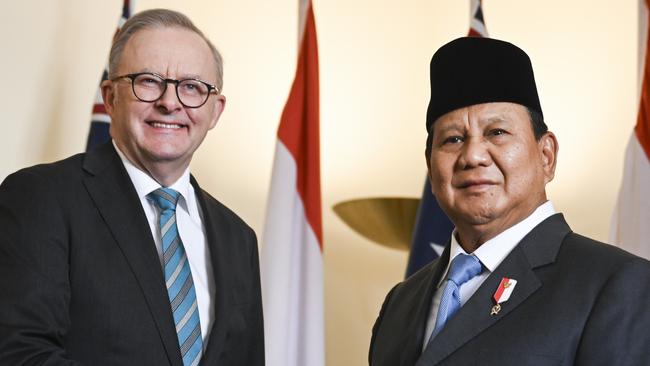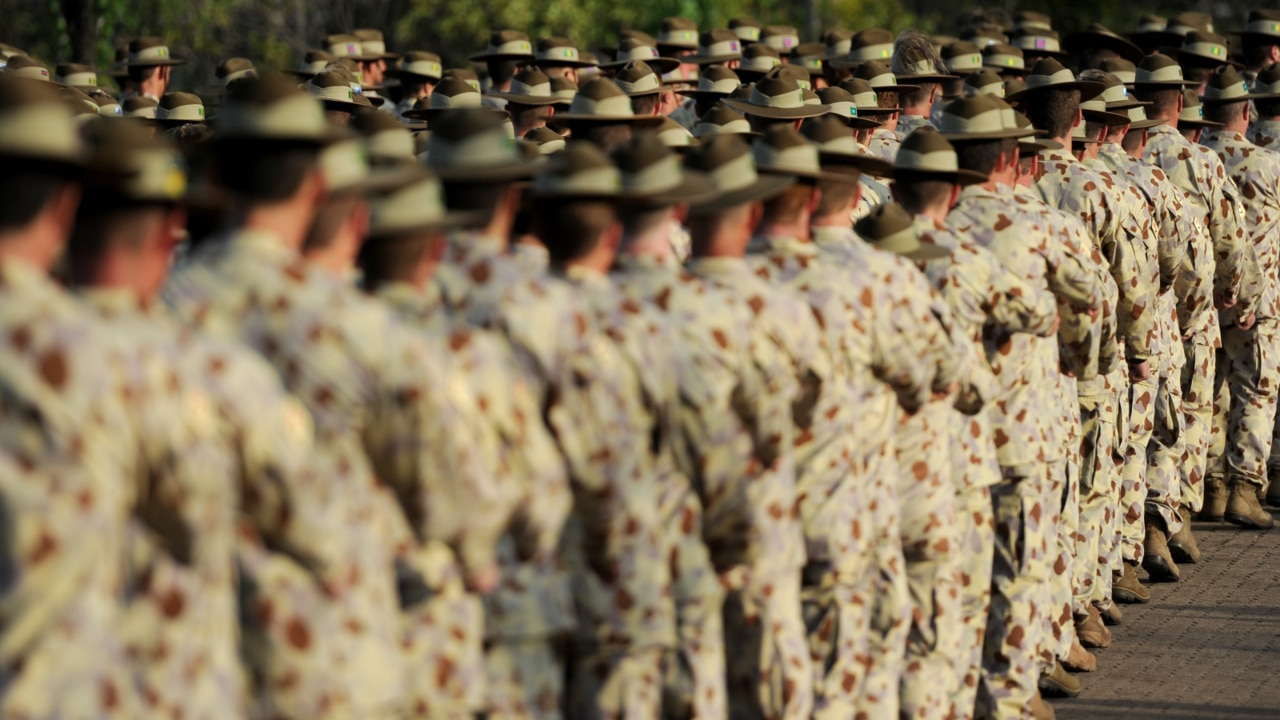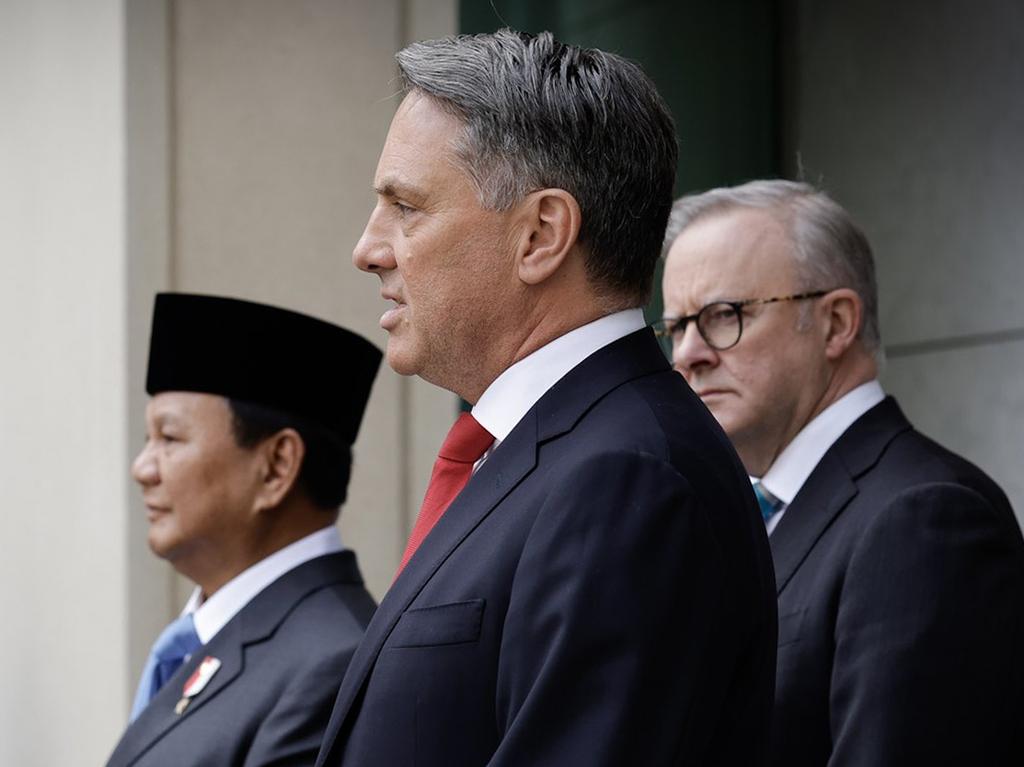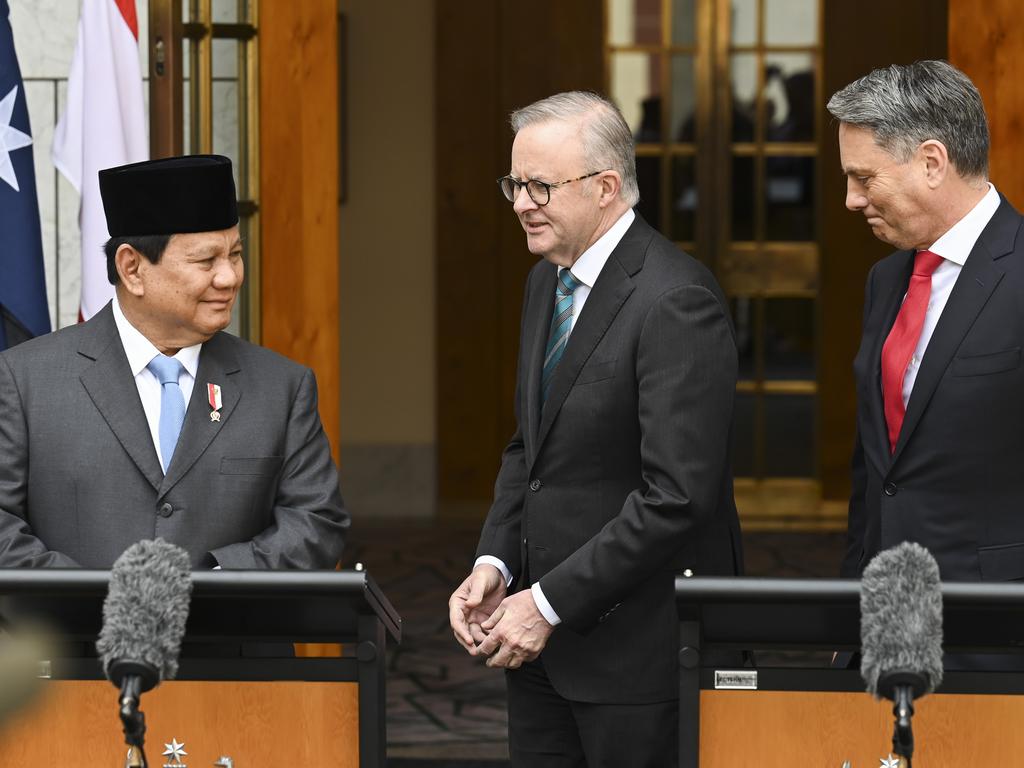New defence pact to strengthen ties with Jakarta
Australia and Indonesia will ramp up joint military exercises to unprecedented levels and boost maritime security co-operation under a historic new defence agreement aimed at countering growing Chinese threats.

Australia and Indonesia will ramp up joint military exercises to unprecedented levels and boost maritime security co-operation under a historic new defence agreement aimed at countering growing Chinese threats.
The pact, finalised during a visit to Canberra by Indonesia’s president-elect Prabowo Subianto, will see Indonesia throw open the doors of its military bases to Australian Defence Force personnel, while streamlining Indonesian military training in Australia.
The Albanese government hailed the treaty-level agreement as a “profoundly significant” one that would become a fundamental new plank in the nation’s security and that of the wider Indo-Pacific.
Richard Marles will travel to Indonesia next week to sign the deal, which comes just weeks after a new agreement with the US to host more American bombers, fighter jets and surveillance aircraft at Top End bases.
Mr Prabowo – the country’s Defence Minister, who will be sworn in as president in October – described the pact as a “good neighbour agreement”, while urging further Australian support for Indonesia’s economy and its fight against drugs.
The text of the defence agreement is yet to be released, but is said to provide a framework for reciprocal access to the nations’ military facilities, and include commitments on training, joint maritime patrols, peace keeping, and humanitarian operations.

It offers no immunities for ADF personnel who run afoul of Indonesian law, which imposes the death penalty for serious offences, but includes a commitment to consult in good faith if Australian troops face charges in the country.
Anthony Albanese, who hosted his soon-to-be counterpart at a meeting on Tuesday with senior Australian ministers at Parliament House, said the agreement was a breakthrough in the nations’ bilateral relationship.
“This historic treaty will bolster our strong defence co-operation by deepening dialogue, strengthening interoperability, and enhancing practical arrangements,” the Prime Minister said.
“It will be a vital plank for our two countries to support each other’s security, which is vital to both countries, but also to the stability of the region that we share.”
Mr Prabowo, a former special forces commander, said while he was determined to preserve his country’s non-aligned status, he wanted to strengthen Indonesia’s ties with key partners.
“I have announced many times that we want the best of relationships with all great powers, but especially with our neighbours,” he said.
“And I have announced that I would like to strengthen the policy of a good neighbour. And in this respect I am very cognisant and I’m very aware of the importance of the Australia-Indonesia relationship as … neighbours, and I would like to continue this collaboration and this co-operation.”
The incoming Indonesian president, who has vowed to eliminate poverty and create good jobs for his people, said he hoped to expand the nations’ economic ties under his presidency.
“We would like to see more Australian participation in our economy,” he said.
“I mentioned several fields in which we would like Australian help, advice, assistance in the field of agriculture, food, security, (and) also in the serious problem of drugs and narcotics.”
Mr Prabowo said the fight against drugs was “of the highest importance” to Indonesia.
Mr Marles said the agreement was a “statement of strategic trust” that would streamline bilateral military co-operation, delivering “much more activity”.
Amid human rights concerns over Indonesia’s rule in West Papua, the Defence Minister said Australia would “bring to bear our values in respect of human rights” when it came to implementing the agreement.
But he said Australia supported Indonesia’s sovereignty in relation to West Papua, declaring “the territorial integrity of Indonesia is fundamentally important for Australia’s national interest”.
Peter Dutton endorsed the pact as a “very important” development that highlighted the “friendship between our two countries”.
Lowy Institute international security program director Sam Roggeveen said while Indonesia was not about to align itself with the West against China, the agreement offered an unparalleled opportunity for Australia to help Indonesia stand more strongly in the wider region.
“Anything Australia can do to help the Indonesian military to modernise and, in particular, to, focus on its maritime capabilities, is very much to be wished for,” Mr Roggeveen said.
“The objective here is to encourage Indonesia to fully embrace its own leadership role as a future great power that, in itself, ought to be taking a strong position on any Chinese ambitions to dominate the region.”
Australian Strategic Policy Institute defence analyst Euan Graham said the agreement was likely to boost cross-border co-operation and support a more pragmatic attitude towards AUKUS by Indonesia, which has expressed concerns over Australia’s nuclear submarine ambitions.
But he said the deal could ultimately fall short of the Albanese government’s aspirations because Indonesia did not share Australia’s perceptions about the threat posed by China.
“Prabowo’s lens on the Australia relationship is primarily that of neighbour to neighbour, not partners in supporting regional order,” he said.
“I suspect … Canberra will have to look elsewhere in the region for the kind of dependable strategic access it needs in a deteriorating security environment.”






To join the conversation, please log in. Don't have an account? Register
Join the conversation, you are commenting as Logout